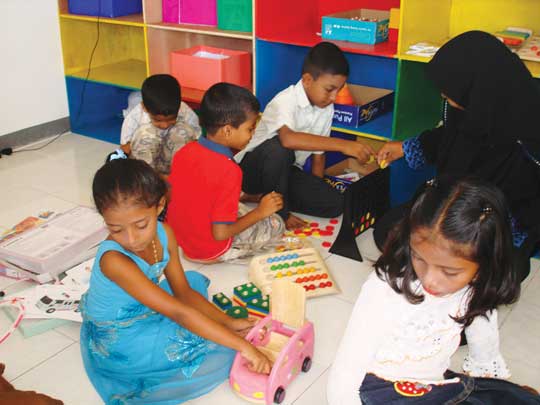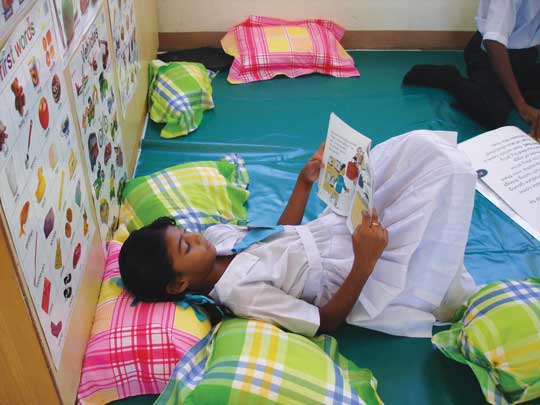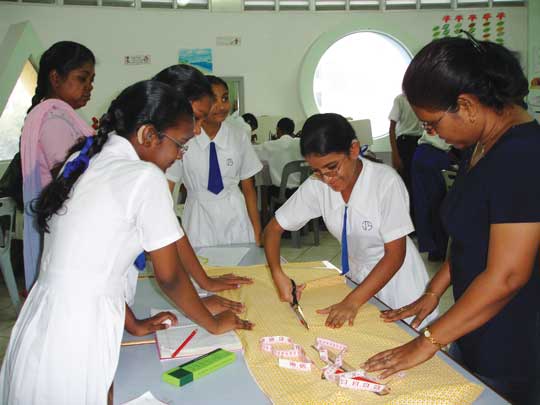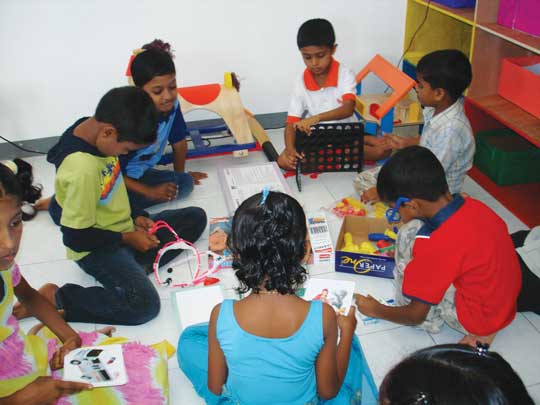Using special educational needs as an entry point for inclusive education in the Maldives
Helen Pinnock and Ahmed Athif
Special educational needs (SEN) and inclusive education are not the same (for instance, it is possible to deliver SEN approaches in non-inclusive or segregated settings). However, SEN approaches often provide an entry point for making the wider changes that an education system needs in order to become inclusive. This is what is happening in the Maldives. The inclusive education team in the Ministry of Education’s (MoE) National Institute of Education (NIE) has been leading efforts to put the recent disability law into practice, and started with SEN approaches as a way to build teachers’ capacity and enthusiasm, whilst having inclusive education as their long-term vision.

Learning through play

A child with autism reading during free time
What does the SEN approach in Maldives do?
SEN teachers in the Maldives help children with disabilities who have been out of school to catch up on the curriculum and then join mainstream classes. The Maldives is an island nation; it has over 1,000 islands grouped in 26 atolls. Because of this geography, important services for children with disabilities are not available in most islands. NIE therefore established SEN teachers to offer varied support to help children with disabilities take part in education. This includes physical rehabilitation, ‘school readiness’ practice, and counselling for parents. SEN teachers assess children for disabilities when they enter school and record their progress each term.
In previous years, many schools discouraged parents from enrolling children with disabilities. If children have been kept out of education and need time to catch up, SEN teachers give them personalised teaching in small groups, encouraging them to build on their strengths. When children have caught up with the curriculum and got used to the routines of school, SEN teachers work with mainstream teachers to get students included in standard classes.
Some schools have specialist SEN teacher groups.These teachers explore ways to support children affected by hearing impairments, or learning difficulties, and share their experience with SEN teachers in other schools through demonstration and training.
Establishing and supporting SEN teachers
At first it was difficult to persuade primary teachers to get involved and become SEN teachers, so NIE set up an incentive payment. Based on the precedent of hardship payments for health workers, the incentive reflected the extra skills and time SEN teachers would provide. UNICEF helped to support extra training for teachers who signed up to become SEN teachers. UNICEF also provided teaching/learning aids for SEN teachers in a ‘demonstration’ group of schools offering SEN teaching. NIE organised observation visits to these schools for teachers from other schools.
A SEN teachers’ network shares ideas with teaching resource centres and supports members through workshops, Facebook and Viber. SEN teachers present their research at teaching conferences, and the teaching materials they have developed will soon be shared with mainstream teachers via a website.
Moving towards inclusive education
Whilst supporting SEN developments, NIE’s inclusive education unit has also developed a national inclusive education policy. The policy details responsibilities for schools, the MoE, teachers and parents in helping all children to reach their potential. It is clear that progress won’t stop with the establishment of SEN classes. The policy stressed that the whole education system takes responsibility for including learners whose needs have not been met.
SEN teaching has already led to some wider system changes. For instance, SEN teachers noticed that the only children with disabilities who entered school on time at Grade 1 were those who had been to pre-school. To increase vital early learning support, NIE therefore started an early intervention programme in 10 pre-schools, training early years teachers to provide inclusive environments. After three years, more children with disabilities are ‘school ready’ when they start Grade 1, and they join mainstream classes with their peers instead of needing SEN classes. NIE aims to have at least one early intervention school in each atoll.
Exposure to good practice through the SEN teachers’ network, and incentive payments, have encouraged more teachers to become SEN teachers. Greater availability of SEN classes has created higher demand among parents for their children with disabilities to go to school. The MoE is on track with its goal to bring a SEN teacher to every school, which will be a sound basis for making every school inclusive.
There is more work to do in helping SEN teachers to influence school management and mainstream teaching. But expanding SEN teaching has shown that children with disabilities can be included with only small changes to the capacity of existing schools, boosting confidence among teachers and parents that inclusive education will grow in the Maldives.
Helen Pinnock is a senior consultant with EENET.
Contact: hpinnock@yahoo.co.uk
Ahmed Athif is Director of the Inclusive Education Unit, NIE Maldives.
Contact: a_athif@nie.edu.mv

Vocational education for children with hearing impairments

Children playing together
